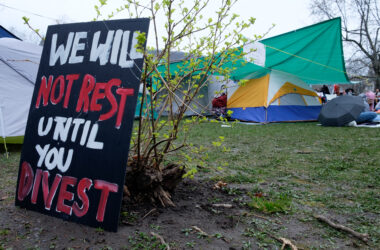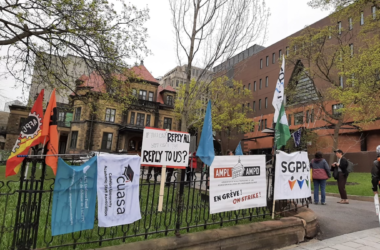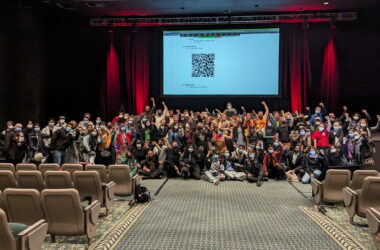 Sam Reynolds / McGill Tribune
Sam Reynolds / McGill TribuneLast week, the SSMU executive held a series of Town Halls to address General Assembly (GA) reform. Under a dozen students attended the Town Halls, which were intended to solicit feedback from and engage students in a discussion on various suggested changes to the GA. Most of the attendees were students already intimately involved in SSMU, who took the chance to discuss solutions to some of the key structural issues with the deliberative body of SSMU. The discussion included a debate on voting methods and on the possibility of suspending or simplifying Robert’s Rules of Order.
GA reform centres around the issue of facilitating and increasing student participation. The issue at the heart of attempts to simplify the GA is the voting method. There is no one time in which students can all attend a GA, nor is there a forum large enough to hold all of SSMU’s members, should they all be interested in attending the GA.
“While quorum is important, what’s really important [to me] is democracy: one person, one vote,” Zach Newburgh, former SSMU President, said. (Newburgh currently sits on the Tribune Publication Society’s Board of Directors.)
Other members of the executive are nervous about a shift online, which could increase participation but would preclude any sort of debate.
“I think the reality about a lot of proposals about moving things online is basically saying ‘I don’t think the GAs work and I don’t think we should have them,'” Arts Representative Jamie Burnett said.
Another discussion regarding the suspension of Robert’s Rules came down to a debate over sacrificing procedure in the interest of accessibility. Participants acknowledged that students find the rules of debate confusing and alienating, and suggestions ranged from handing out printed guides before the General Assembly to adopting a modified version of Roberts Rules to introducing differently coloured placards for “Yes” or “No” votes, as well as “Question” or even “I’m confused.” However, for Newburgh, having a structure like Robert’s Rules is important because it works as a mechanism to facilitate more respectful and orderly debate, which protects minorities in potentially heated debates.
“The minority, being people who are undecided and actually want to hear the debate, get lost in translation essentially … it happens every time,” Education Representative Kady Paterson said. “But Robert’s Rules is, to a certain extent, a good safeguard against that.”
At the same time, debate often finds itself bogged down in procedural issues that many members of the audience don’t understand. The onus of facilitating debate is placed on the Speakers of Council, Nida Nizam and Michael Tong. Many Town Hall participants made an effort to mention that this year’s Speakers are particularly good at striking a balance.
“I think, with all things procedural, we’re looking at that tension of how do we facilitate a process moving forward quickly, while making sure it doesn’t become a messy disaster,” Knight said.
VP External Joël Pedneault explained that the GA is a relatively new forum and flaws in its structure are in part due to the fact that the rules governing the body have been introduced piecemeal, and the current executive demonstrated a desire to move forward with the reform process constructively.
“I think it’s time that we stopped to circulate [the] notion that the General Assembly is just this place where intimidation is rampant … it’ll become a self-fulfilling prophecy if people paint the GA as this place that people act disrespectfully to each other; I think it’s time to circulate the notion that this is the place for respectful direct democracy to happen on campus if you’re an undergraduate,” he said.
Reforms will be passed in council as part of broader changes in SSMU’s bylaws. Students can contribute to the discussion by filling out SSMU’s survey—accessible via Facebook—speaking to their faculty councilors, and attending further town halls (dates to be determined).








